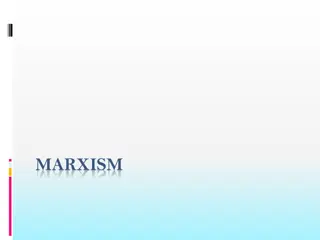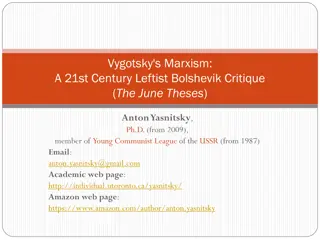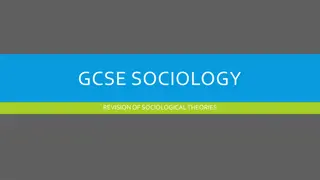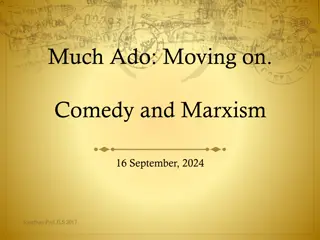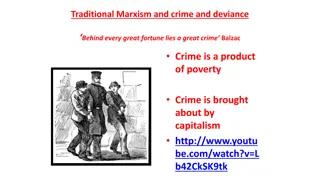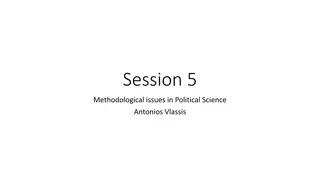Understanding Marxism: Principles and Theories Explored
Marxism is a theoretical system developed from the writings of Karl Marx, emphasizing historical materialism, dialectical materialism, theory of surplus value, theory of alienation, and more. It posits that societal structures are determined by economic conditions and that progress evolves through dialectical conflicts culminating in synthesis. Explore the foundational concepts of Marxism in this insightful overview.
Download Presentation

Please find below an Image/Link to download the presentation.
The content on the website is provided AS IS for your information and personal use only. It may not be sold, licensed, or shared on other websites without obtaining consent from the author. Download presentation by click this link. If you encounter any issues during the download, it is possible that the publisher has removed the file from their server.
E N D
Presentation Transcript
Marxism as a theoretical system developed out of, and drew inspiration from, the writings of Karl Marx. Marxism as a codified body of thought came into existence only after Marx s death. It was the product of the attempt by later Marxists. Principles of Marxism The Materialistic interpretation ofhistory. Dialectical Materialism. Theory of Surplusvalue. Theory ofAlienation Theory of class Struggle. The Dictatorship of the proletariat Classless and stateless society.
The Materialistic interpretation of history (HISTORICAL MATERIALISM) Marx interpretation of history is based onmaterialism. the other According to him economic structure of society decide structures of society. All the social, political, intellectual relations, legal systems, outlooks, which emerge in the course of history are derived from the material conditions of life. The progress and development is determined by the material conditions of social life. Change in production- relations call forth the change in the whole social system and political-order.
DIALECTICAL MATERIALISM The word 'dialectic' literally means discussion or logicalargument. The theory of Dialectical Materialism is based on Hegel's theory of the dialectic which explains the progress of civilization through thesis, antithesis and synthesis. At any given point of time there exists one dominant idea in society, termed as thesis, over a period of time there emerges a new idea opposing the thesis, termed asantithesis.
The thesis and antithesis clash, discussion and argument takes place and a new idea emerges. It is better than the thesis and antithesis known as synthesis. With the passage of time, the synthesis becomes the dominant idea in society and assumes the role of thesis. Again it goes through the process of dialectic. Karl Marx applied theory of dialectic to materialism.
THEORY OF SURPLUS VALUE The difference between the value of goods produced by the workers and the actual wages paid to them termed as surplusvalue. Value to the commodity is created by the worker but profit (surplus value) is pockted by capitalist. The capitalist exploit the workers because they own the means of production and the workers are forced to sell their labour tothem.
While employing them, they pay them the minimum wages, get more work done by them. According to Marx labour is the real productive factor but the worker does not receive a just share of thevalue. To expose the injustice and exploitation under the capitalist system Marx explained the theory of surplusvalue. This exploitation will serve as one of the reasons that motivates the proletariat to revolt against the Bourgeoisie, leading to a classwar.
THEORY OF ALIENATION The process whereby the worker is made to feel foreign to the products of his/her own labor. In capitalism, the proletariat works in order to live, in order to obtain the very means of life, which he can only achieve by selling his labour to a capitalist for a wage. The worker is alienated from his/herproduct. Because s/he no longer owns that product, which now belongs to the capitalist
Capitalist has purchased the proletariats labour power in exchange for exclusive ownership over the proletariat'sproducts. All profit accrued by the sale of those products goes to the capitalist. The product of the workers labour is in a very real sense alien to the worker. It is not his/her product but the product of capitalist. the
THEORY OF CLASS STRUGGLE The Communist Manifesto, the Bible of the working class, starts with the statement "The history of all existing society is the history of the class struggles". The struggle between the two opposing classes the class of oppressors and the class of the oppressed. At every stage of social development a particular class got control on the means of production and exploited therest. Dominant class alone enjoyed freedom and used the state also as an instrument to preserve its economicpower.
In Capitalist system workers class are subjected toexploitation. In the capitalist order the interest of the capitalist class is to maximise the profit, whereas the interest of the working class lies in the enhancement of wage. Marx calls upon the working class to unite and overthrow the capitalist order. TheWorking men of all countries, unite. Proletarians have nothing to loose but their chains They have a world towin.
THE DICTATORSHIP OF THE PROLETARIAT Marx believed that when the class war takes place, the proletariat will emerge victorious. Although the purpose of the class war is to establish a stateless and classless society, this objective cannot be achieved until all state institutions such as the bureaucracy; judiciary, legislature, executive etc are abolished. Hence before the abolition of the state, society would undergo a transitional period in which the proletariat assumed control on all aspects of state. Proletariat dictatorship means power in the hands of the working people for building up a communistsociety.
CLASSLESS AND STATELESS SOCIETY Marx says that during the phase of dictatorship of the proletariat, the labour class would control the state's institutions and use them to destroy capitalism. The proletariat would then use the state institutions to establish a society based on economic and socialjustice. Once this is achieved, the proletariat would renounce its dictatorship and all institutions of state would gradually cease to exist. This would eventually lead to the withering away of the state itself.






